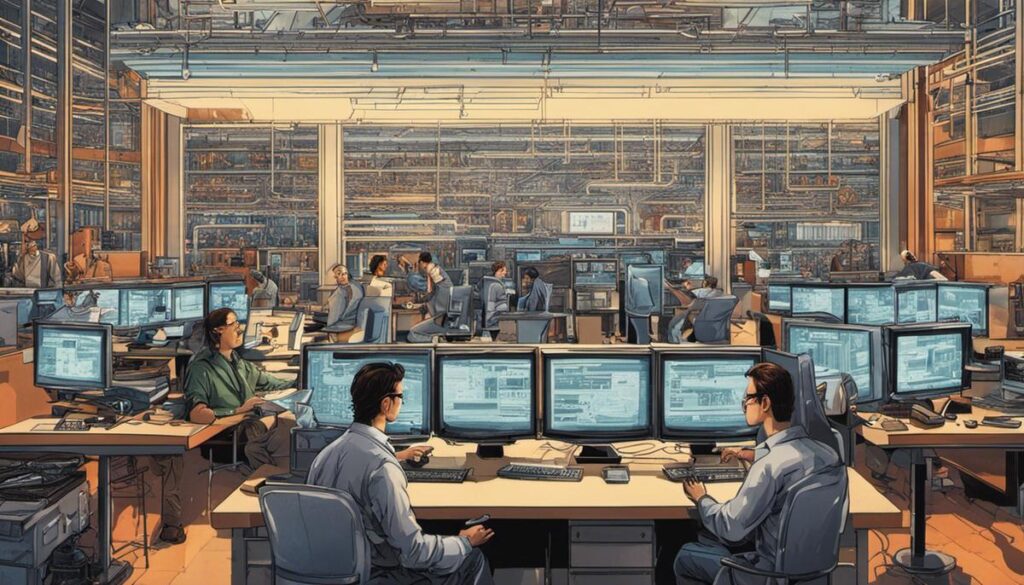Computer science vs software development – what is the difference? Both disciplines, plowing forward technological progress, offer dynamic perspectives and career paths embedded in the vast domain of information technology. This article gleams into the definitions, core concepts, skill sets, career paths, academic training, field experiences, and future trends enveloping computer science and software development. Facing a sprawling diversity of applications, the subjects of computer science and software development are both immensely vast and vitally important, influencing every imaginable industry.
Definition and Basic Concepts
Unraveling the Essence: Fundamental Principles and Definitions of Computer Science and Software Development
Computer Science and Software Development form a fascinating tapestry of technological artistry that shapes our world. At its nucleus lies a rich effusion of principles, methods, and designs that serve as its foundational framework.
To begin our examination, we should first define these two intricately linked disciplines. Computer Science, as a field of study, delves into the theoretical foundations of information and computation, employing algorithms to process, understand, store, and communicate digital information. Conversely, Software Development is the creative process of conceiving, designing, programming, documenting, debugging/testing, and maintaining applications, frameworks, or other software components.
At the heart of computer science lies the principle of universality, concentrating on the design of algorithms that run on any computational device. The essence of this principle surges from the Church-Turing thesis, articulating that any computation performed by one modern computer can be equally performed by another. This theory has been instrumental in outlining the scope and limitations of what can be computed.
Computer science orbits around the principle of abstraction, too. Abstraction serves as a method for organizing complex systems, enabling the reduction of intricate interconnections into manageable modular designs. Each layer reduces specific information while simultaneously retaining properties useful for the layer above. This scaffolding enables computer scientists to plunge into the depths of any computational challenge, no matter how convoluted.
Software development, on the other hand, adheres ardently to the principle of modularity. Each complex program is divided into smaller, interrelated modules that are independently designed and coded, thereby enhancing understandability, adaptability, and maintainability.
Integral to software development is the clarity of purpose reflected in the principle of interface design. An efficiently designed interface should speak the language of the user, with words, phrases, and concepts familiar to the user rather than system-oriented terms. This user-centered approach makes technological creations more accessible and relatable, contributing to their ubiquity in today’s world.
Agile principles shape software development, emphasizing adaptive planning, evolutionary development, early delivery, and continuous improvement. It promotes a disciplined project management process that espouses frequent inspection and adaptation, a leadership philosophy that encourages teamwork, self-organization, and accountability, and a set of engineering best practices.
For a synergistic overlap, the universal computational model serves as a bridge from the theoretical examination of computation in Computer Science to practical implementation in Software Development. This computational model is an abstraction of the computer’s structure and its behavior, thereby guiding the creation of efficient algorithms and programming languages.
Closing in on the essences of computer science and software development, we realize it unveils an entire universe of experimentation and discovery. The glorious amalgamation of theoretical constructs and pragmatic applications invites us to use our creative graces and conceive technological solutions that have the potency to infuse revolutionary changes in our world. Endeavoring to understand this beautiful intricacy underscores the importance of these fields, bridging our computational dreams to reality. The pursuit of innovations and advancements, driven by these principles, forms the crux of this perpetual scientific exploration.

Career Path
Building upon the foundational definitions of computer science and software development, it becomes incumbent to delve into the complexities of their respective career paths. These two domains, while interlaced and often operating in tandem, offer unique trajectories that diverge from each other in substantial ways.
Computer science, with its emphasis on the principles of universality, abstraction, and the universal computational model, tends to lean more toward the theoretical. As a scrupulous mental exercise, computer science careers often encompass roles such as researchers, academicians, or theoreticians. Intellectually dipped in mathematical theories and logical analysis, their research often navigates through the underlying principles that govern the digital world. They seek to untangle the intricate knots of computational problems and often develop algorithms that serve as an intellectual foundation for practical applications. Generally, their work, driven by curiosity and a zeal for discovery, often breeds innovation and shapes the future of technology.
On the other hand, software development careers are practically grounded. Imbibing the principles of modularity, interface design, and agile methodologies, these professionals often aim to transform theoretical concepts into functional software. Diverse roles in software development range from frontend developers, backend developers, and full-stack developers to quality assurance engineers and DevOps engineers. Unlike their counterparts in computer science, they work within the constraints of market demand and user specifications.
Within this realm resides an architectural artistry not dissimilar to that found in physical buildings or machinery. Developers design, build, and oftentimes maintain the software ‘buildings’ that house various features or ‘rooms’. They fluidly adapt to evolving technologies, scripting languages, and trendy frameworks, constantly refining their craft to ensure their creations offer utility and ease to their users.
Both fields, despite their distinctiveness, intersect in significant ways. Their collaborative interaction catalyzes the birth of advanced systems, beneficial applications, and sophisticated algorithms. For instance, innovative solutions like machine learning, artificial intelligence, or natural language processing are birthed at this intersection, each incorporating the theoretical and practical truths from both realms.
The scholastic endeavors of computer scientists enrich the knowledge pool, providing a solid theoretical platform. Meanwhile, software developers pragmatically navigate the real world, steering their theoretical knowledge toward effectively solving real-world applications. Their synergy reinforces the evolutionary cycle of technology, propelling our digital civilization forward. The career trajectories in these fields reflect this collaboration and symbiosis, allowing individuals to seamlessly move between them or straddle them based on their passion and predilection. On a broader spectrum, both careers contribute to an academic and industrial revolution that continuously reshapes human life and holds a promising prospect for our technologically intertwined future.
Skill Set
Given the understanding that both computer science and software development are vast fields with intersections yet distinct demarcations, it becomes imperative to understand the skill sets unique to each one. Understanding these fundamental competencies enriches the widening landscape of computing and hence could guide aspiring students, professionals, or even researchers in tracing their path towards their passion.
A computer scientist, akin to a theoretical physicist, operates largely in the realm of abstract concepts and theories. This position demands analytical acumen, a stringent logic-mathematical aptitude, and, above all, a penchant for problem-solving. A mastery of algorithms, data structures, computational theory, artificial intelligence, and machine learning forms the bedrock of computer science skills. Being able to devise novel theoretical models that could potentially form the basis for new technology delineates the proficiency of a computer scientist.
Moreover, a deep understanding of the principles that underline operating systems, databases, and networks is crucial. This necessitates being capable of developing and proving theorems and the ability to create new algorithms or data structures. Intricate mathematical skills, including linear algebra, calculus, and statistics, are a prerequisite for operating in the field of computer science, catering to the need for devising new models and algorithms.
Software development, on the other hand, is a concrete manifestation of these computational theories. Here, the essential skills venture beyond theory into the realm of applicable programming languages, with an emphasis on proficiency in at least one high-level programming language. A strong familiarity with front-end technologies for user interfaces and experience—such as HTML, CSS, and Javascript—is typically required.
Depth of knowledge in frameworks and libraries to build software applications, such as .NET, Python’s Django, or Javascript’s React, is paramount. A proficiency in version control systems, specifically Git, to manage and track source code changes is a sine qua non. Most importantly, software developers need problem-solving skills, aptitude for collaborative work, and adaptability to the continuously evolving software landscape.
Life in today’s digital age undoubtedly revolves around software. Consequently, a software developer needs to empathize with the user and consider their perspective in designing and creating human-computer interfaces. User-centric software requires developers to acquire skills in user experience and user interface design, an amalgamation of psychological understanding and aesthetic sensibilities.
The dichotomy between computer science and software development could seem to blur, yet it marks a creative collaboration—where theoretical knowledge meets hands-on application. Both fields are equally critical drivers of incessantly evolving digital revolutions.
While computer science provides the theoretical foundations, software development builds on it to create tangible applications that undergird nearly every aspect of modern life, from education and healthcare to business and entertainment. This beautiful synthesis underlines the significance of these intertwined fields and the vast expanse of skills they encompass.
Academic Training vs Field Experience
Academic training in computer science provides an individual with a solid foundation necessary to understand not only concepts but also the algorithms that provide the backbone for software development.
It is founded on essential theories and principles that govern computation and information processing.
The comprehensive study involves abstract concepts such as algorithms, data structures, and computational theory, as well as other trending topics like artificial intelligence, machine learning, and blockchain technology.
Furthermore, concepts of operating systems, databases, and computer networks form an integral part of academic training.
In-depth knowledge of mathematics, especially linear algebra, calculus, and statistics, is crucial in computer science.
This strong mathematical basis distinguishes academic training in computer science from practical field experience in software development.
Whereas the former emphasizes theoretical concepts and analytical proficiency, the latter is more application-oriented, generally relying on specific programming languages and tools.
Software development in the field demands a blend of solid technical skills and an understanding of business needs.
It demands knowledge of front-end technologies and programming languages, familiarity with numerous libraries and frameworks, and proficiency in version control systems, particularly Git.
This mix of abilities, however, is not typically covered in computer science curricula, which are more focused on theoretical underpinnings and less geared toward specific tools or industry trends.
An inherent dynamism characterizes the realm of software development, fueled by the rapid evolution of technologies, augmentation of scripting languages, and ubiquitous frameworks.
Iterative and incremental methodologies, including Agile principles, have become crucial to facilitate constant adaptations.
This calls for professionals to exhibit high problem-solving skills, aptitude for collaborative work, and the ability to adapt swiftly to these changes.
In an effort to bridge the gap between theory and practice, skills such as user experience and user interface design are gaining prominence.
A high value is also placed on the ability to understand and articulate project requirements – in essence, developing a solution from a problem statement.
These skills place the user at the center of software development, echoing the challenges of real-world applications.
Despite these differences, it’s worthwhile to note that computer science and software development are not mutually exclusive realms.
Instead, they coexist, with the former providing theoretical grounding and the latter offering practical experience.
It is this creative collaboration that has birthed state-of-the-art applications and systems.
Together, they contribute to what can be described as the digital revolution, driving innovation and advancements that reach beyond the realm of academics into industry and beyond.
The flexibility of these fields permits career trajectories that seamlessly blend or shift between the roles of computer scientist and software developer.
This dynamic nature assures the constant exchange of ideas, principles, and methodologies between academic training and practical field experience—thus fostering an environment of continuous learning, creativity, and innovation.
In essence, while academic training in computer science sharpens analytical acumen, practical field experience in software development hones problem-solving and application skills.
Each has a distinct value proposition, and together, they provide the robust backbone to our increasingly digital world.
Ultimately, the amalgamation of both – theoretical knowledge coupled with practical experience – forms the crux of driving our future in technology.
Future Trends
The Scope of Emerging Technologies and Market Needs
Emerging technologies undeniably offer exciting new frontiers for both computer science and software development. As technologies such as artificial intelligence (AI), machine learning (ML), the Internet of Things (IoT), and blockchain continue to evolve and proliferate, the discipline of computer science will be called upon to comprehend their theoretical underpinnings and to create groundbreaking algorithms for their operation.
Casting light on AI, this revolutionary technology necessitates a profound understanding of complex algorithms, neural networks, and data structures. It challenges the computational theory itself, prodding for the development of more sophisticated models. Meanwhile, ML is a subset of AI that is poised to bring forth unprecedented levels of automation in data analysis, obliging computer scientists to undertake constant enhancements in existing algorithms.
The Internet of Things (IoT), another ground-breaking technology, beckons for the creation of robust, secure networks, given its extensive reliance on connectivity for operation. This connectivity thrusts to the fore the significance of mastering principles underlying operating systems, databases, and networks in computer science. Simultaneously, it highlights the necessity of integrating principles of software development, such as modularity and agile methodologies.
On the other hand, blockchain technology is already disrupting multiple sectors with its secure, distributed ledger system. This necessitates astute knowledge of computer networks and databases, in addition to mastery of applicable programming languages and front-end technologies. Attempting to accommodate such transformative technology engenders a fusion of skills between computer scientists and software developers.
Market needs can hardly remain the same in the wake of such technological advancements. Anticipating these needs, software development will indeed be compelled to adapt. The demand for software developers well-versed in fresh technologies and capable of tooling frameworks and libraries around them will undoubtedly surge. Consequently, proficiency in version control systems, specifically Git, will become even more critical as collaboration and adaptability become crucial in a rapidly evolving development ecosystem.
Furthermore, inexorable as it seems, the advent of these emerging technologies will accelerate the move toward user-centric software. Therefore, skills in User Experience (UX) and User Interface (UI) design will be as vital as ever to software developers. The ability of software developers to comprehend and articulate project requirements will hence be paramount.
While emerging technologies disrupt the fields of computer science and software development, the silver lining lies in the wealth of opportunities they present. They facilitate a continuation of the digital revolution and enable computer science and software development to explore uncharted territories of innovation.
Thus, an embrace of continuous learning, creativity, and innovation – hallmarks of both fields – will be indispensable in overcoming initial hurdles. Looking ahead, the ability to flexibly shift one’s focus and career trajectory based on passion and preference could become the norm rather than the exception. Hence, it is beyond doubt that the future belongs to those who strive for the commitment and comprehension that this rapidly evolving landscape demands.

Equipped with the prowess of computer science and the craftsmanship of software development, tech professionals are transforming the course of our digital and real-world landscapes. By charting the ongoing evolution and examining the core competencies, we iterate the multifaceted nature of these fields and their enduring growth potential. As we hurdle toward an AI-fueled future, computer science and software development embody an essential pair of tools in our technological toolkit. Their intersection, the frontier of new transformations, shall continue to open unprecedented opportunities and challenges for the next era.

